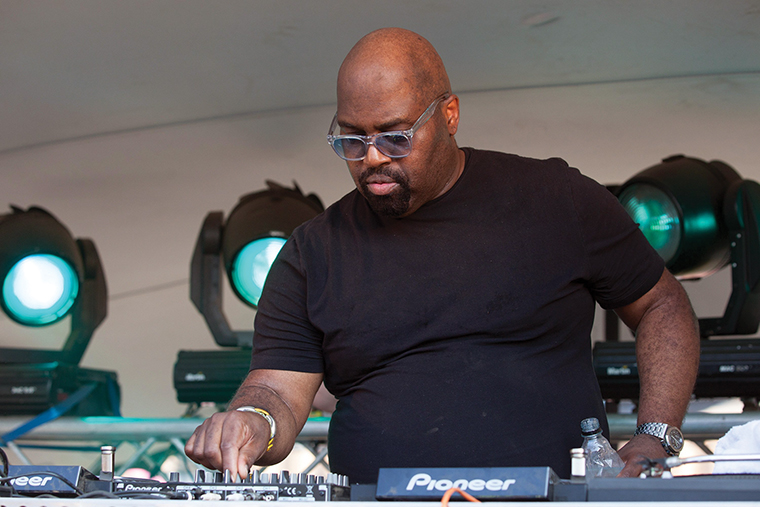Father of house music Frankie Knuckles dies
Chicago DJ Frankie Knuckles performed at the Lovebox Weekender in London’s Victoria Park July 21, 2013. Knuckles—known as the father of house music—died March 31 at age 59.
April 7, 2014
Frankie Knuckles, a Chicago DJ whose work gave life to house music and earned him the nickname “The Godfather of House,” has died.
Knuckles died March 31 at 59 years old after a long battle with diabetes. The 1998 Grammy Award winner began his DJ career playing at multiple New York clubs in the ‘70s before relocating to Chicago and spinning at the Warehouse Club in 1977.
His unique combination of R&B and disco hits with funk, reggae and Europop additives birthed the house music genre—named after the historic Chicago club. His mixture of pulsating beats and electro-pop vocals from artists such as Michael Jackson, Diana Ross and Chaka Khan became a staple for house music producers to come.
Alan King, partner at the Chicago office of the Philadelphia law firm Drinker Biddle & Reath, is a DJ for the Chosen Few, a group of DJs including Jesse Saunders and Wayne Williams, who were also part of the rise in popularity of Chicago house music in the ‘70s.
King said he had known Knuckles since the late ‘70s but became especially close with him during the last 10 years, partially because of the Chosen Few.
“Frankie was an inspiration for all of us who were DJs who loved house music,” King said. “It’s a real loss. He changed my life. [His death] is one of the hardest things I’ve ever had to deal with.”
King said one of his favorite DJ performances with Knuckles was in 2011 at The Chosen Few Picnic, a Hyde Park music festival celebrating Chicago house music. The two also performed together at the House of Blues in 2003, King said, adding that it was an honor to play alongside Knuckles.
“As great as he was as a DJ and a music producer, he was an even better person,” King said. “He lit up every room he walked into and he had the greatest smile and gave the best hugs in the world.”
By the early ‘80s, Knuckles began spinning at local club the Power Plant using a reel-to-reel tape recorder to edit his tracks to achieve a seamless flow and keep dancers on the floor. Knuckles’ music was unique because it appealed to older and younger audiences, King said.
Knuckles’ influence in Chicago is evident—the city even has a street named after him, where the historic Warehouse club once stood. Jefferson Street between Monroe Street and Van Buren Street is known as “Honorary Frankie Knuckles Way.”
“Over his long career, Frankie made his way into the ranks of those artists and innovators who came to this city not just to contribute to a musical genre, but to create one themselves,” said Mayor Rahm Emanuel in a statement. “In doing so, he also made his way into the hearts of those who knew him and the many more who followed his work.”
James DeRogatis, a lecturer in the English Department and host of Sound Opinions, a music talk show aired on many radio stations, had interviewed Knuckles for his show and worked with him at an event in 2012 at the Museum of Contemporary Art.
“Frankie was an incredibly warm and kind man and was infinitely huggable,” DeRogatis said. “He radiated this sense of passion for community and helped build the Chicago house scene. He was the cornerstone of it.”
DeRogatis said Knuckles’ sound was known as the music of the dispossessed youth because it was very popular among gay youth, Latinos and blacks. He said Knuckles was an essential part of the group of house artists who envisioned the genre when disco music—from which house music is derived—became increasingly less popular in mainstream music.
Knuckles did not like to be put on a pedestal, preferring to be surrounded by all different people enjoying his music, DeRogatis said, adding that he created a communal spirit at his riveting performances.
“In Chicago, [Knuckles] could walk down the street and no one would know him, [except] those of us in that community [who] would greet him like a god,” DeRogatis said. “It’s not that Frankie didn’t think he was a star. Frankie thought every single person in the [venue] on any given night was a star.”
Monica Hairston O’Connell, the executive director of the Center for Black Music Research at Columbia, said Knuckles’s death was a major blow to the college community. The center is in the process of acquiring Knuckles’ music for its burgeoning house music collection.
O’Connell said she approached Knuckles because he was prominent in the city house scene and she wanted to promote his presence.
“He was really good at being an architect of creating time,” O’Connell said. “People would be able to dance for hours without realizing how much time had passed. It’s a great loss for Chicago and the world.”








